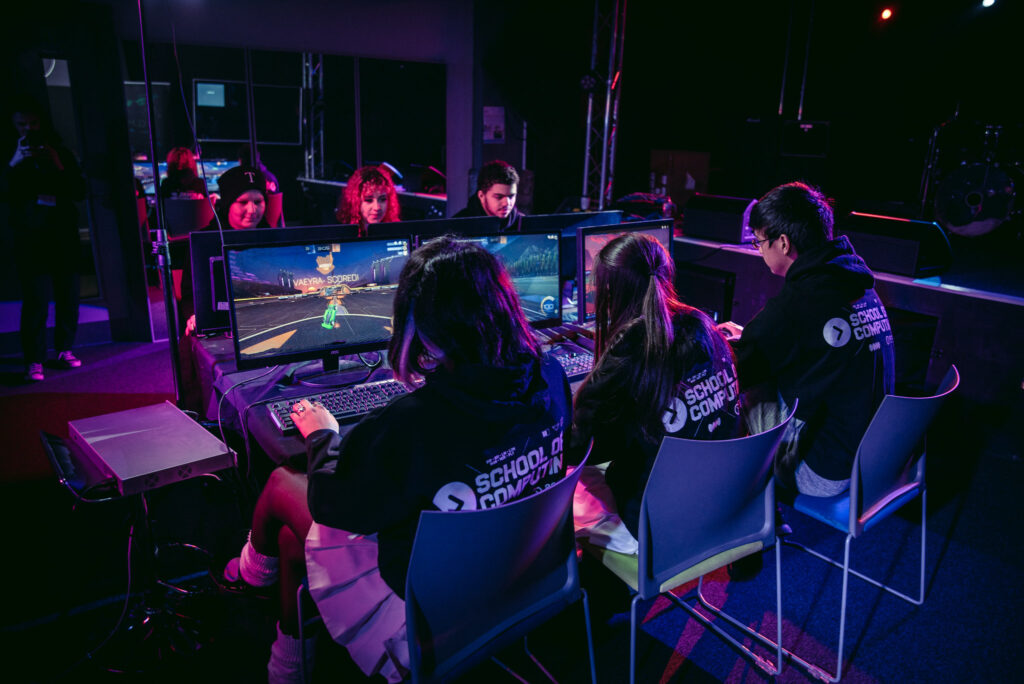Why has esports become the fastest-growing sport in the world? We explore this question.
Esports have become a cultural powerhouse, drawing in diverse audiences, including people of all ages and backgrounds. We look into the story of esports’ rise, its evolution, its economic impact, and its future.
What is esports?

To understand why esports is the fastest-growing sport globally, we must first answer the question, “What is esports?”.
Esports (electronic sports) involves competitive gaming where individuals or teams face off in video games, often at a professional level. These competitions are not only entertaining but also highly strategic, requiring players to show teamwork, reflexes, and game knowledge.
Unlike traditional sports, esports occur in virtual arenas, attracting fans from around the world who watch via streaming platforms like Twitch and YouTube. This accessibility has been a key factor in its widespread appeal, making it possible for fans to watch their favourite games and players from their homes.
Esports events range from small, local tournaments to massive international spectacles, such as The International for Dota 2 or the League of Legends World Championship. These events draw millions of viewers, showcasing the popularity of esports as a form of entertainment and competition.
The evolution of esports

Esports didn’t become the fastest-growing sport in the world overnight. Its evolution is a story of innovation, community, and technological advancement. The seeds of modern esports were planted as early as the 1970s when players gathered for arcade game competitions. However, it wasn’t until the late ’90s and early 2000s that esports began to take shape.
One of the pivotal moments in esports history was the release of broadband internet, which allowed players to connect and compete globally. This paved the way for online multiplayer games like StarCraft and Counter-Strike to gain massive followings.
Another turning point was the creation of dedicated esports leagues and championships. The creation of Major League Gaming (MLG) in 2002 and the release of platforms like Twitch in 2011 were significant milestones that helped bring esports into the mainstream. These platforms provided a stage for players to showcase their skills and for fans to engage with their favourite games and personalities.
What’s driving modern-day esports growth

Several factors have contributed to the rise of esports. One of the most significant drivers is technology. The development of high-speed internet, advanced gaming hardware, and sophisticated software has made it easier than ever for players to compete and for fans to watch from anywhere in the world.
Global connectivity has also played a crucial role. With millions of players and fans across different continents, esports has a vast and diverse audience. This widespread appeal is further enhanced by changing attitudes towards gaming. Once dismissed as a niche hobby, gaming is now recognised as a legitimate form of entertainment, providing opportunities for career development and community building.
Social media and streaming platforms have transformed how esports is experienced and shared. These platforms allow fans to connect, discuss, and celebrate their favourite games and players, creating a sense of community and engagement that drives further interest and participation in esports.
The economic impact of esports

With an estimated global revenue of over $1.22 billion in 2023, esports has become a lucrative industry that offers numerous opportunities for job creation and investment. This booming sector includes revenue streams such as sponsorships, advertising, merchandise sales, and media rights.
Esports have also led to the creation of new industries which focus on supporting its growth. These include companies specialising in gaming peripherals like event management and content creation. Furthermore, the integration of esports into traditional media, such as content broadcasts and major sporting events, has expanded its reach and influence.
The rise of esports has created economic opportunities and attracted significant investment from traditional sports teams, celebrities, and global brands. These stakeholders recognise the potential of esports to engage a younger demographic and drive brand loyalty.
Esports courses and career paths

Esports is not just about playing games, it’s also opening doors to new educational and career opportunities. For school leavers and further education learners, the esports industry offers various pathways, from professional gaming to roles in marketing, event management, and game development.
Many further education colleges now offer specialised esports courses focusing on teamwork, digital marketing, and sports management. These programs provide students with the skills needed to succeed in an industry that values creativity, strategic thinking, and technological ability.
The future of esports

As the fastest-growing sport in the world, esports’ future looks promising. With continued advancements in technology, esports are poised to reach new heights, attracting even larger audiences and creating more opportunities for players and fans.
Emerging technologies like virtual reality (VR) and augmented reality (AR) have the potential to revolutionise how esports is played and experienced. These innovations could create immersive environments that blur the lines between the virtual and physical, offering exciting possibilities for competition and engagement.
Will an esports Olympics happen?

While esports shares many similarities with traditional sports, such as competition, strategy, and teamwork, its inclusion in the Olympics remains a topic of debate. However, there have been recent developments.
The International Olympic Committee (IOC) has recently taken steps to incorporate esports into the Olympic movement by establishing the Olympic Esports Games. This initiative aims to bring esports into a more formalised Olympic context, similar to traditional sports. The first Olympic Esports Games are set to take place in 2025 in Saudi Arabia.
This event is designed to showcase esports on a global stage, aligning it with the prestige of the Olympic brand. However, it’s important to note that while esports will have its own dedicated Olympic-style event, it has not been included as a medal event in the Summer or Winter Olympic Games.
Esports stats: The numbers behind the phenomenon

Here are some impressive statistics that reflect esports’ incredible growth:
- The global esports market is projected to reach a revenue of $4.3 billion in 2024, with an annual growth rate of 7.10% from 2024 to 2028.
- North America holds a 37.2% share of the global esports market, thanks to its well-established ecosystem.
- The market size of esports in 2024 is over $2.39 billion, with a viewership of 640 million.
- The United States is the leading revenue generator in the esports market.
Join the esports revolution

Esports is not just a trend, it’s a revolution reshaping the landscape of sports and entertainment. With its rapid growth, economic impact, and potential to transform education and career paths, esports has proven itself to be the fastest-growing sport in the world.
For gamers and school leavers looking to explore this exciting industry, the opportunities are endless. Whether you aspire to compete professionally, work behind the scenes, or simply enjoy the thrill of watching your favourite games, esports offers a vibrant and dynamic community.
For those keen to learn more, consider enrolling in an esports course at Access Creative College. Here, you can gain valuable insights, skills, and connections to thrive in the esports world. Step into the digital arena and be part of the future of sports. Apply online today!
















